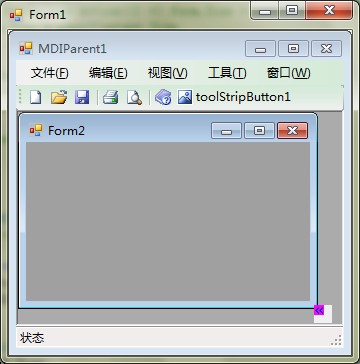模块化的开发,将模块合并到一起的时候,遇到了Mdi不能添加到其它窗口下的问题。
分两种情况:
将mdi窗口A设成普通窗口B的子控件,需要将A的TopLevel设置成false,但是Mdi窗口的TopLevel必须为顶级;
将mdi窗口A设成mdi窗口B的子窗口,A.MdiParent = B,编译时不通过,窗口不能既是mdi子级,又是mdi父级。
最后通过windows Api强制将mdi窗口A的parent设置成窗口B。
[DllImport("user32.dll", EntryPoint = "SetParent")] public static extern int SetParent(IntPtr hWndChild, IntPtr hWndNewParent); MDIParent1 form = new MDIParent1(); SetParent(form.Handle, this.Handle); form.Location = new Point(0, 0); form.Size = this.Size; form.Show();
通过SetParent将mdi窗口强行放到了普通的Form下。
调试的时候,界面上达到了预期的目标,但是发现了另一个新的问题。
焦点在mdi的子窗口上时,mdi窗口上的控件无效,点击事件全部触发不了;焦点在mdi的父窗口上时,mdi窗口的控件又“激活”了。而在单独打开mdi窗口时,完全不存在这个问题。
查询了一下msdn里面的SetParent的说明,发现了如下段:
“For compatibility reasons, SetParent does not modify the WS_CHILD or WS_POPUP window styles of the window whose parent is being changed. Therefore, it is not possible to change a window from parent to child or from child to parent.”
我的理解是,虽然用SetParent强制将普通窗口设置成mdi的父窗口,但是mdi的子级窗口的属性却没有赋予。
解决的思路,调用另一个windows·Api SetWindowLong强制修改mdi的窗口属性。
private const int GWL_STYLE = -16; private const int WS_CHILD = 0x40000000;//设置窗口属性为child [DllImport("user32.dll", EntryPoint = "GetWindowLong")] public static extern int GetWindowLong(IntPtr hwnd, int nIndex); [DllImport("user32.dll", EntryPoint = "SetWindowLong")] public static extern int SetWindowLong(IntPtr hwnd, int nIndex, int dwNewLong); var s = GetWindowLong(form.Handle, GWL_STYLE); SetWindowLong(form.Handle, GWL_STYLE, s | WS_CHILD);
至此,问题算解决了。发一个效果图:

补充一个bug:虽然解决了mdiParent获取焦点的问题,后来发现mdiChild获取焦点又不正常了。如果mdiChild,如上图中的Form2界面上有TextBox控件时,修改TextBox的文字时,光标的位置,总是不正常。能力有限,尚待解决。
